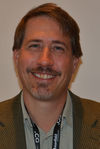Matthew Zook: Difference between revisions
No edit summary |
No edit summary |
||
| (2 intermediate revisions by 2 users not shown) | |||
| Line 2: | Line 2: | ||
|portrait = MatthewZookPortrait.JPG | |portrait = MatthewZookPortrait.JPG | ||
|caricature = MatthewZ.jpg | |caricature = MatthewZ.jpg | ||
|affiliation= ZookNic | |||
|born = | |born = | ||
|country = USA | |country = USA | ||
|email = zook [at] zooknic.com | |email = zook [at] zooknic.com | ||
|website = | |website = http://www.floatingsheep.org, http://www.zook.info | ||
|blog = | |blog = | ||
|twitter = mattzook | |twitter = mattzook | ||
| Line 13: | Line 14: | ||
}} | }} | ||
'''Matthew Zook''' is the Principal at [[ZookNic]], | '''Matthew Zook''' is the Principal at [[ZookNic]], a domain name data aggregation and analysis service. He is also a Professor a the University of Kentucky, specializing in research related to technological change and geographies of globalization.<ref name="icannwiki">[[ICANN 45]] Interview. ICANNWiki. Retrieved 2012 October 25.</ref> | ||
He is involved with multiple geo-related mapping organizations, such as New Mappings Collaboratory, an initiative at the University of Kentucky that is dedicated to innovations in mapping through place-based thinking, analysis, and representation.<ref>[http://new-maps.com/ New Maps]. Retrieved 2012 November 9.</ref> He also works with Floating Sheep, a less academic site dedicated to mapping and analyzing geocoded data from user-generated sources such as Twitter.<ref>[http://www.floatingsheep.org/p/about-us.html About Us]. Floating Sheep. Retrieved 2012 November 9.</ref> | He is involved with multiple geo-related mapping organizations, such as New Mappings Collaboratory, an initiative at the University of Kentucky that is dedicated to innovations in mapping through place-based thinking, analysis, and representation.<ref>[http://new-maps.com/ New Maps]. Retrieved 2012 November 9.</ref> He also works with Floating Sheep, a less academic site dedicated to mapping and analyzing geocoded data from user-generated sources such as Twitter.<ref>[http://www.floatingsheep.org/p/about-us.html About Us]. Floating Sheep. Retrieved 2012 November 9.</ref> | ||
| Line 29: | Line 30: | ||
* Global Air Travel Geographies - how differences in history, position, and power affect the distance and position of different players in the global economy. | * Global Air Travel Geographies - how differences in history, position, and power affect the distance and position of different players in the global economy. | ||
On these topics, he has | On these topics, he has extensively written as well as collaborated on many publications<ref>[http://scholar.google.com/citations?user=e04_WEwAAAAJ Matthew Zook]. Google Scholar. Retrieved 2012 November 9.</ref>, including but not limited to: | ||
* Graham, M, Zook, M. and A. Boulton. 2012. ''Augmented Reality in the Urban Environment: Distorted Mirrors and Imagined Reflections.'' Transactions in British Geography. Forthcoming. | * Graham, M, Zook, M. and A. Boulton. 2012. ''Augmented Reality in the Urban Environment: Distorted Mirrors and Imagined Reflections.'' Transactions in British Geography. Forthcoming. | ||
* Graham, M. and M. Zook. 2012.'' Augmented realities and uneven geographies: Exploring the geolinguistic contours of the Web.'' Environment and Planning A. Forthcoming. | * Graham, M. and M. Zook. 2012.'' Augmented realities and uneven geographies: Exploring the geolinguistic contours of the Web.'' Environment and Planning A. Forthcoming. | ||
| Line 38: | Line 39: | ||
* Zook, M and T. Shelton. (2012). ''The Integration of Virtual Flows into Material Movements within the Global Economy.'' Chapter in Cities and Flows (P. Hall and M. Hesse Eds.) pp. 42-57. | * Zook, M and T. Shelton. (2012). ''The Integration of Virtual Flows into Material Movements within the Global Economy.'' Chapter in Cities and Flows (P. Hall and M. Hesse Eds.) pp. 42-57. | ||
* Graham, M and M. Zook. (2011). ''Visualizing the Global Cyberscape: Mapping User Generated Placemarks.'' Journal of Urban Technology. 18(1). 115-132. | * Graham, M and M. Zook. (2011). ''Visualizing the Global Cyberscape: Mapping User Generated Placemarks.'' Journal of Urban Technology. 18(1). 115-132. | ||
* Zook, M., Graham, M., Shelton, T. and S. Gorman. (2010). ''Volunteered Geographic Information and Crowdsourcing Disaster | * Zook, M., Graham, M., Shelton, T. and S. Gorman. (2010). ''Volunteered Geographic Information and Crowdsourcing Disaster Relief: A Case Study of the Haitian Earthquake.'' World Health and Medical Policy. Vol 2(2). | ||
* Crutcher, M. and M. Zook. (2009). ''Placemarks and Waterlines: Racialized Cyberscapes in Post Katrina Google Earth.'' GeoForum. 40(4). 523-534 | * Crutcher, M. and M. Zook. (2009). ''Placemarks and Waterlines: Racialized Cyberscapes in Post Katrina Google Earth.'' GeoForum. 40(4). 523-534 | ||
* Dodge, M., Kitchin, R. and M. Zook (2009). ''How does software make space? Exploring some geographical dimensions of pervasive computing and software studies (Guest Editorial).'' Environmental and Planning A. 41(6). 1283–1293. | * Dodge, M., Kitchin, R. and M. Zook (2009). ''How does software make space? Exploring some geographical dimensions of pervasive computing and software studies (Guest Editorial).'' Environmental and Planning A. 41(6). 1283–1293. | ||
| Line 69: | Line 70: | ||
__NOTOC__ | __NOTOC__ | ||
[[Category:Academia]] | |||
[[Category:Writers]] | |||
Latest revision as of 16:06, 7 July 2021
 |
 |
| Affiliation: | ZookNic |
| Country: | USA |
| Email: | zook [at] zooknic.com |
| Website: |
|
| Twitter: |
Matthew Zook is the Principal at ZookNic, a domain name data aggregation and analysis service. He is also a Professor a the University of Kentucky, specializing in research related to technological change and geographies of globalization.[1]
He is involved with multiple geo-related mapping organizations, such as New Mappings Collaboratory, an initiative at the University of Kentucky that is dedicated to innovations in mapping through place-based thinking, analysis, and representation.[2] He also works with Floating Sheep, a less academic site dedicated to mapping and analyzing geocoded data from user-generated sources such as Twitter.[3]
Career History
In the 2007-2008 academic year, Zook was a Fullbright scholar using his time to study Estonia's information society and economy, in an attempt to explain why the country has one of the highest use of mobile devices and wifi in the world.[4] He also led the Internet Geography Project at UC Berkeley, which tracked the commercial use of the Internet worldwide.[5]
Publications
In 2012, Zook contributed articles to The Economist entitled The New Local, about the increasingly intertwined nature of physical and digital worlds and The World In Your Pocket, which addresses digital mapmaking.[6]
Zook categorizes his research into four general categories[4]:
- Geography of E-Commerce - how IT and the Internet interact with economic systems;
- Software-Created Spaces (Code-Space) - how code, space, and place interact with the use of digital and mobile technologies;
- Internet Geographies - how Internet networks affect places and people;
- Global Air Travel Geographies - how differences in history, position, and power affect the distance and position of different players in the global economy.
On these topics, he has extensively written as well as collaborated on many publications[7], including but not limited to:
- Graham, M, Zook, M. and A. Boulton. 2012. Augmented Reality in the Urban Environment: Distorted Mirrors and Imagined Reflections. Transactions in British Geography. Forthcoming.
- Graham, M. and M. Zook. 2012. Augmented realities and uneven geographies: Exploring the geolinguistic contours of the Web. Environment and Planning A. Forthcoming.
- Shelton, T, Zook, M. and M. Graham. (2012). The Technology of Religion: Mapping Religious Cyberscapes. The Professional Geographer. Forthcoming.
- Roberts, S., Secor, A., and M. Zook. (2012). Critical Infrastructure: Mapping the Leaky Plumbing of US Hegemony. Antipode. Vol 44. 1. pp. 5-9.
- Zook. M. (2012). The Virtual Economy. Chapter for The New Companion to Economic Geography (Eds. J. Peck, T. Barnes and E. Sheppard).
- Boulton, A and M. Zook. (2012). Coding cultural geographies: landscape, locative media and the map. Chapter in New Companion to Cultural Geography. Forthcoming.
- Zook, M and T. Shelton. (2012). The Integration of Virtual Flows into Material Movements within the Global Economy. Chapter in Cities and Flows (P. Hall and M. Hesse Eds.) pp. 42-57.
- Graham, M and M. Zook. (2011). Visualizing the Global Cyberscape: Mapping User Generated Placemarks. Journal of Urban Technology. 18(1). 115-132.
- Zook, M., Graham, M., Shelton, T. and S. Gorman. (2010). Volunteered Geographic Information and Crowdsourcing Disaster Relief: A Case Study of the Haitian Earthquake. World Health and Medical Policy. Vol 2(2).
- Crutcher, M. and M. Zook. (2009). Placemarks and Waterlines: Racialized Cyberscapes in Post Katrina Google Earth. GeoForum. 40(4). 523-534
- Dodge, M., Kitchin, R. and M. Zook (2009). How does software make space? Exploring some geographical dimensions of pervasive computing and software studies (Guest Editorial). Environmental and Planning A. 41(6). 1283–1293.
- Zook M. (2009). Internet, Economic Geography. In Kitchin R, Thrift N (eds) International Encyclopedia of Human Geography, Volume 5, pp. 555-561. Oxford: Elsevier.
- Zook M, Dodge M. (2009). Mapping, Cyberspace. In Kitchin R, Thrift N (eds) International Encyclopedia of Human Geography, Volume 6, pp. 356-367. Oxford: Elsevier.
- Dodge, M. and M. Zook (2009). Internet Measurement. In Kitchin R, Thrift N (eds) International Encyclopedia of Human Geography, pp. 569-579. Oxford: Elsevier.
- Zook, M. and M. Graham. (2007). The Creative Reconstruction of the Internet: Google and the Privatization of Cyberspace and DigiPlace. GeoForum. Vol. 38(6). 1322-1343.
- Zook, M. and M. Graham. (2007). Mapping DigiPlace: Geo-coded Internet Data and the Perception of Place. Environment and Planning B. 466-482.
- Grubesic, T. and M. Zook. (2007). A Ticket to Ride: Evolving Landscapes of Air Travel Accessibility in United States Journal of Transportation Geography. Vol. 15 (6). 417-430.
- Zook, M. (2006). The Geographies of the Internet. In Annual Review of Information Science and Technology (ARIST) ed. B. Cronin. Volume 40. 53-78.
- Zook, M and S. Brunn. (2006). From Podes to Antipodes: New Dimensions in Mapping Global Airline Geographies. Annals of the Association of America Geographers. September. 471-490.
- Zook, M.A. (2005). The Geography of the Internet Industry: Venture Capital, Dot-coms and Local Knowledge. Blackwell Publishers.
- Zook, M.A. (2004). The Knowledge Brokers: Venture Capitalists, Tacit Knowledge and Regional Development. International Journal of Urban and Regional Research. (September): 621-41.
- Zook, M.A., Dodge, M., Aoyama, Y., and A. Townsend. (2004). New Digital Geographies: Information, Communication, and Place. In Geography and Technology. Brunn, Cutter and Harrington (eds.). Kluwer Academic Publishers. 155-176.
- Zook, M.A. (2003). Underground globalization: Mapping the space of flows of the internet adult industry. Environment and Planning A. Vol 35(7). 1261-1286.
- Zook, M.A. (2002). Hubs, nodes, and bypassed places: A typology of e-commerce regions in the United States. Tijdschrift voor economische en sociale geografie. Vol 93. No.5. pp. 509-521.
- Zook, M.A. (2002). Grounded capital: Venture financing and the geography of the internet industry, 1994-2000. Journal of Economic Geography. Vol 2. No 2. 151-177.
- Zook, M.A. (2001). Old hierarchies or new networks of centrality? The global geography of the internet content market. American Behavioral Scientist. (June). Vol 44. No. 10. 1679-1696.
- Zook, M.A. (2000). The web of production: The economic geography of commercial internet content production in the United States. Environment and Planning A. Vol. 32. 411-426.
Fun Fact
Zook once used domain name analytics to testify in federal court regarding the geography of the adult industry.[1]
References
- ↑ 1.0 1.1 ICANN 45 Interview. ICANNWiki. Retrieved 2012 October 25.
- ↑ New Maps. Retrieved 2012 November 9.
- ↑ About Us. Floating Sheep. Retrieved 2012 November 9.
- ↑ 4.0 4.1 Matthew Zook's Current Work. zook.info. Retrieved 2012 November 9.
- ↑ Matthew Zook - Larta Fellow. Larta. Retrieved 2012 November 9.
- ↑ UK Geographers Featured in 'The Economist'. Retrieved 2012 November 9.
- ↑ Matthew Zook. Google Scholar. Retrieved 2012 November 9.
External Links
- The New Local: The physical and the digital world are becoming increasingly intertwined, The Economist. Published 2012 October 27.
- The world in your pocket: Mapmakers are competing for your smartphone, The Economist. Published 2012 October 27.
